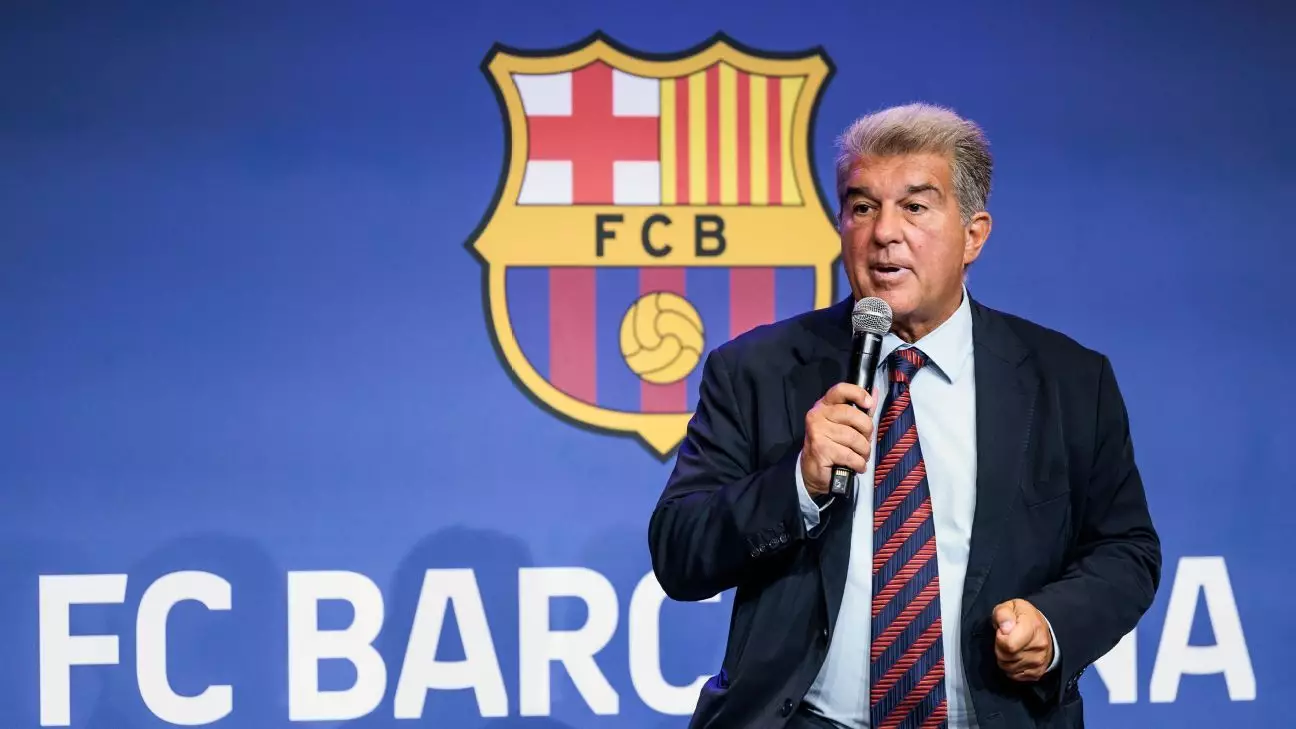In the realm of football, financial management often dictates the trajectory of a club’s success on and off the field. Recently, FC Barcelona President Joan Laporta faced scrutiny during the club’s annual general meeting when members voted on the financial accounts for the 2023-24 season. The results, revealing a considerable net loss of €91 million ($98.9 million), have ignited debates surrounding the efficacy of Laporta’s strategies and his board’s ability to revive a club previously enveloped in financial turmoil.
Barcelona’s recent annual accounts presented an alarming net loss, primarily attributed to faltering investments in the club’s “Barça Vision” subsidiary. This scenario doesn’t merely reflect poor financial decisions but paints a broader picture of a club grappling with systemic fiscal challenges that have compounded since 2017. Laporta’s defense of his board’s performance hinged on a narrative of transformation, asserting that the club’s financial state was improving despite the current deficits.
Under his leadership, Barcelona has embarked on ambitious measures, including the sale of a segment of the club’s television rights and the divestiture of assets like Barça Studios. Additionally, the board has prioritized cost reduction, specifically by trimming the first-team wage bill to enhance financial viability. This holistic approach is vital; it signals an intent to not only address current liabilities but also to instill a sustainable model for the future.
Laporta pointed out that while financial stability has not yet been fully achieved, there are promising signs. He asserted that the salary-to-income ratio had improved significantly, moving away from an unsustainable rate of 98%. Such performances indicate a positive step, yet questions linger regarding the long-term sustainability of these measures, especially in light of ongoing debts and operational costs.
In his address, Laporta took a resolute stand against critics who question his management strategies, particularly those referencing the controversial Negreira case involving payments to a former Spanish refereeing official. He underscored a sentiment of resilience, suggesting that Barcelona’s anthem encapsulates their ethos of fighting against all odds. The implication is clear: success breeds resentment, and Barcelona, navigating through adversity, must remain steadfast against detractors.
The discourse surrounding the Negreira case is emblematic of broader issues within sport, where scrutiny and speculation can wield significant influence over a club’s reputation. Laporta’s response to such criticisms suggests a commitment to transparency and loyalty to the club’s legacy, emphasizing that the board’s focus remains on winning both in court and on the pitch, and further distancing the club from allegations of impropriety.
Another focal point in Laporta’s address was the club’s investment strategy in player development. He emphasized the importance of cultivating homegrown talent, which not only aids in financial sustainability but builds a stronger connection to the club’s rich heritage. For instance, the summer acquisition of Dani Olmo for €47 million reflects a calculated approach aimed at balancing youth and experience.
Under the guidance of new head coach Hansi Flick, Barcelona’s strategic reorganization aims to reincorporate returning players into the competitive lineup. Flick’s announcements regarding players like Gavi and Fermín López recovering from injury offer hope for an invigorated squad capable of upholding the club’s aspirations.
The synergy between financial responsibility and sporting ambitions becomes crucial in this context. Flick’s remarks suggest that the upcoming matches will play a significant role in assessing the effectiveness of these managerial changes and their influence on team morale.
FC Barcelona stands at a crossroads, with financial realities colliding against the backdrop of competitive football. Joan Laporta’s leadership will be scrutinized as he seeks to navigate the club through turbulent waters towards a stable and prosperous future. By focusing on sustainable financial practices, leveraging homegrown talent, and maintaining a competitive spirit, Barcelona can potentially redefine its legacy in modern football.
The unfolding events at Barcelona will not just affect its immediate performance but will also set the tone for future administrative decisions. As members affirm their support for Laporta’s vision, the challenge remains: can he translate boardroom success into victories on the pitch? The journey ahead is fraught with challenges, but it is equally rich with opportunities for resurgence and glory.

